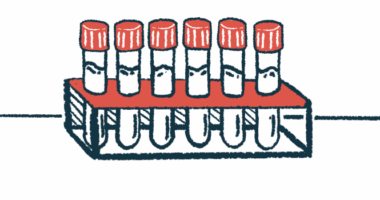Daily IPL344 for up to 3 years seen to slow ALS progression in trial
Top-line data from small Phase 1/2 study support therapy's development

Up to three years of daily treatment with the investigational therapy IPL344 was well tolerated and slowed disease progression among adults with amyotrophic lateral sclerosis (ALS), according to top-line data from a small Phase 1/2a clinical trial.
Preliminary efficacy analyses also indicated that IPL344 might be able to increase body weight, preserve respiratory function, and prolong survival among ALS patients, as shown relative to an external placebo group.
The findings were announced by the therapy’s developer, Immunity Pharma, which now plans to submit the data for publication in a scientific journal.
“These early-stage data support further development of IPL344 as a treatment for ALS, and merit further investigation in a large number of participants,” Eran Ovadia, Immunity’s CEO, said in a company press release.
“We intend to progress [IPL344] to a pivotal clinical trial in ALS,” Ovadia added. That would support an application for the drug’s approval, pending positive results.
Monthly declines in ALS progression of 48% seen with IPL344
IPL344 is a peptide designed to stimulate cellular pathways thought to be protective in ALS. It specifically activates the Akt pathway that’s involved in the survival of motor neurons — the specialized nerve cells that communicate with muscle cells to coordinate voluntary movements — which are progressively lost in ALS.
Studies indicate that Akt signaling is diminished in people with ALS. By boosting Akt activity, it’s believed that IPL344 may help to protect motor neurons and slow ALS progression.
In preclinical studies, IPL344 treatment improved neuromuscular function, prevented weight loss, and extended survival in a mouse model of ALS.
The investigational therapy has received orphan drug designation in the U.S. and Europe — a status intended to accelerate a treatment’s clinical development by offering regulatory support and financial incentives.
The Phase 1/2a trial evaluated IPL344’s safety and preliminary efficacy among nine ALS patients, ages 18-80, at a single site in Israel. All were experiencing quickly progressing disease, defined as at least a 0.55-point monthly decline in scores on the ALS Functional Rating Scale-Revised (ALSFRS-R).
In the Phase 1 portion (NCT03652805), all participants received increasing daily doses of IPL344, delivered as an injection directly into the bloodstream, for 28 days, or about one month). The starting dose of 1.7 mg/kg was increased by 0.5 mg/kg every 3-4 days up to a maximum dose of 3.2 mg/kg. Interim results indicated the treatment was safe and well tolerated.
Participants then continued receiving daily IPL344 for up to 36 months, or three years, in the Phase 2 part of the trial (NCT03755167).
Immunity now reports that IPL344-treated participants lost a mean of 0.53 points per month in the ALS Functional Rating Scale Revised (ALSFRS-R) with up to three years of treatment, reflecting a significant, 48% slowing in disease progression.
If confirmed in a subsequent larger Phase 3 study, the magnitude of reduction in ALSFRS-R progression observed in this study is greater than that achieved with currently approved drugs.
When disease stage and other influential factors were considered in the statistical analysis, monthly declines were found to be 64% slower.
“If confirmed in a subsequent larger Phase 3 study, the magnitude of reduction in ALSFRS-R progression observed in this study is greater than that achieved with currently approved drugs,” said Ilana Cohen, PhD, Immunity Pharma’s vice president of research and development.
Study’s participants see longer survival time compared with placebo group
Patients also experienced increases in body weight, a significant difference from a pooled group of placebo-treated patients involved in previous ALS clinical trials, in which patients continuously lost weight as the disease progressed. Those natural history data were housed in the PRO-ACT ALS patient database.
Moreover, average monthly declines in respiratory function were 44% slower on IPL344 than in the historical placebo group, though this difference was not statistically significant.
The median survival time on IPL344 was 29 months, or nearly 2.5 years, compared with 19 months, or a little longer than 1.5 years, in an external placebo group from a clinical trial of a different therapy. This comparison suggests a trend toward prolonged survival with IPL344.
For the eight patients with available data, reductions in neurofilament light chain (NfL) — a marker of nerve damage — also were observed for all but one. That patient experienced a stabilization in NfL levels. This reflects a possible neuroprotective effect of the therapy, according to Immunity.
IPL344 reportedly was well tolerated, with no major serious adverse events associated with the therapy and no treatment discontinuations due to side effects from the medication.
“We are excited that treatment with IPL344 was well tolerated in people with ALS and demonstrated encouraging signs of efficacy across multiple parameters,” Cohen said.
Long-term survival follow-up for these nine patients is ongoing. The trial initially planned to enroll 15 participants, but was suspended early due to a shortage in the investigational therapy.








